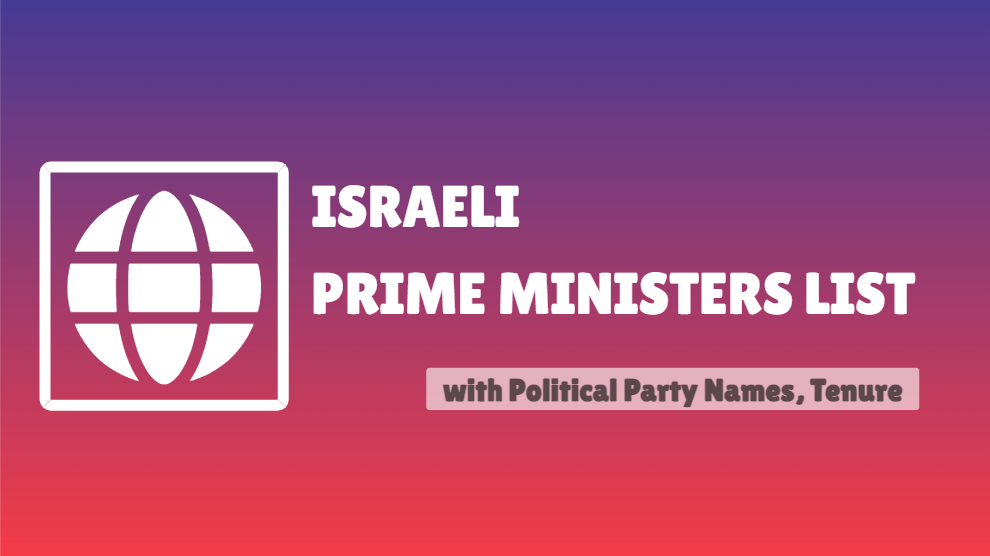
All time Israeli Prime Minister List is now available online, checkout the names of PM of Israel since 1948. Fourteen people have served as prime minister of Israel, five of whom have served on two or three non-consecutive occasions. Additionally, one person, Yigal Allon, has served solely as an acting prime minister. The other two who have served as acting prime minister have gone on to become the prime minister. Here is the complete list of all the prime ministers of Israel since the adoption of the Israeli Declaration of Independence in 1948.
Israeli Prime Minister List
| No. | Name | Lifespan | Political Party | Term of Office |
|---|---|---|---|---|
| 1 | David Ben-Gurion | (1886–1973) | Mapai | 14 May 1948 – 26 January1954 |
| 2 | Moshe Sharett | (1894–1965) | Mapai | 26 January 1954 – 3 November 1955 |
| (1) | David Ben-Gurion | (1886–1973) | Mapai | 3 November 1955 – 26 June 1963 |
| 3 | Levi Eshkol | (1895–1969) | Mapai, Alignment (Mapai/Labor) | 26 June 1963 – 26 February 1969 |
| – | Yigal Allon (Acting) | (1918–1980) | Alignment, Labor | 26 February 1969 – 17 March 1969 |
| 4 | Golda Meir | (1898–1978) | Alignment, Labor | 17 March 1969 – 3 June 1974 |
| 5 | Yitzhak Rabin | (1922–1995) | Alignment, Labor | 3 June 1974 – 20 June 1977 |
| 6 | Menachem Begin | (1913–1992) | Herut, Likud | 20 June 1977 – 10 October 1983 |
| 7 | Yitzhak Shamir | (1915–2012) | Herut, Likud | 10 October 1983 – 13 September 1984 |
| 8 | Shimon Peres | (1923–2016) | Alignment, Labor | 13 September 1984 – 20 October 1986 |
| (7) | Yitzhak Shamir | (1915–2012) | Herut, Likud | 20 October 1986 – 13 July 1992 |
| (5) | Yitzhak Rabin | (1922–1995) | Labor | 13 July 1992 – 4 November 1995 |
| (8) | Shimon Peres | (1923–2016) | Labor | 4 November 1995 – 18 June 1996 |
| 9 | Benjamin Netanyahu | (born 1949) | Likud | 18 June 1996 – 6 July 1999 |
| 10 | Ehud Barak | (born 1942) | One Israel, Labor | 6 July 1999 – 7 March 2001 |
| 11 | Ariel Sharon | (1928–2014) | Likud, Kadima | 7 March 2001 – 4 January 2006 |
| 12 | Ehud Olmert | (born 1945) | Kadima | 4 January 2006 – 31 March 2009 |
| (9) | Benjamin Netanyahu | (born 1949) | Likud | 31 March 2009 – 13 June 2021 |
| 13 | Naftali Bennett | (born 1972) | Yamina | 13 June 2021 – 30 June 2022 |
| 14 | Yair Lapid | (born 1963) | Yesh Atid | 1 July 2022 – 29 December 2022 |
| (9) | Benjamin Netanyahu | (born 1949) | Likud | 29 December 2022 – Present |
Role of PM in Israel
The role of the Prime Minister in Israel is similar to that of the heads of government in other parliamentary systems. The Prime Minister is the head of the Israeli government and is responsible for the overall administration and governance of the country. Here are some key aspects of the Prime Minister’s role in Israel:-
- Head of Government: The Prime Minister is the head of the Israeli government and is responsible for setting the policy agenda, making decisions, and leading the government’s activities.
- Executive Authority: The Prime Minister exercises executive authority, which includes overseeing government ministries, appointing and dismissing ministers, and managing the functioning of the government.
- Legislative Role: The Prime Minister plays a crucial role in the legislative process. They propose legislation to the Knesset (Israeli Parliament), work to gain support for government policies, and coordinate the government’s legislative agenda.
- Foreign Policy: The Prime Minister represents Israel on the international stage. They engage in diplomacy, meet with world leaders, and negotiate agreements on behalf of the country. The Prime Minister also formulates and implements foreign policy strategies.
- Security and Defense: The Prime Minister is responsible for the country’s security and defense policies. They work closely with the military and intelligence agencies to ensure national security and respond to security threats.
- Cabinet Leadership: The Prime Minister presides over the meetings of the Cabinet, where major policy decisions are discussed and approved. They coordinate the work of government ministers and ensure effective functioning of the executive branch.
- Crisis Management: In times of crisis, the Prime Minister takes a central role in managing emergencies, such as security threats, natural disasters, or economic crises. They provide leadership and make critical decisions to protect the country’s interests.
It’s important to note that the powers and influence of the Prime Minister can vary depending on the specific individual, their political party, and the political dynamics within the country.










